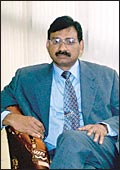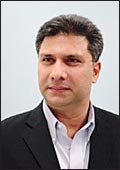|
As
India becomes integrated with the global economy, it is becoming
imperative for people across industries to be prepared to work
not just anywhere across the country, but across the globe as
well. This places many demands on them, but, perhaps, the most
important is the ability to quickly assimilate and work in alien
cultures. "You have to be sensitive to local culture and
traditions," says Ravi Kant, Managing Director, Tata Motors.
That, in fact, is fast becoming a key determinant
of success in today's multi-cultural and borderless corporate
environment. "Wipro's it services business is based on a
Global Delivery Model. Both employees and customers come from
every part of the world and, hence, understanding cultural nuances
is essential," says Ranjan Acharya, the company's Corporate
Senior Vice President (Human Resources). This comprehension isn't
restricted to the it industry alone, but to several other fast-growing
sectors such as pharma, retail, infrastructure and manufacturing.
"We are unleashing the largest talent pool in the world today
and around 200 million people will join the nation's productive
age bracket by 2013. The opportunity is there for all to see and
it is for us to grasp it with both hands-but this will only happen
if we prepare ourselves to become truly global citizens,"
says P.C. Rajiv, Head (hr) abb.
To be successful in the global marketplace
it is imperative to focus on areas such as etiquette, culture,
interpersonal communications, conflict resolution and man-management
skills, especially when teams are spread across geographies. "The
cross-cultural training at Tesco Hindustan Service Centre (Tesco
HSC) enables our people to understand and appreciate different
cultures and customs, and this leads to better service delivery
to our customers," says Sudheesh Venkatesh, Head (HR) Tesco
HSC, the Indian it and BPO arm for the British retail giant.
 |
 |
"We look not only for
technical skills but also for cultural adaptability "
S. Padmanabhan
Executive Vice President (Global HR), TCS |
"You have to be sensitive
to local culture and traditions to succeed"
Ravi Kant
Managing Director, Tata Motors |
Today, international experience is almost
becoming sine qua non for rising up the corporate hierarchy. Ambitious
executives will do well to remember that competence, even excellence,
in one's core functions contributes only partially to one's success.
"When we hire people, we look not only for technical skills
but also for cultural adaptability and the way they present themselves,"
says S. Padmanabhan, Executive Vice President, Global Human Resources,
TCS. Ambitious executives, please take note.
Mohanbir Sawhney, McCormick Tribune Professor
of Technology and Director of the Center for Research in Technology
& Innovation at Kellogg Graduate School of Management, us,
has been quoted in the media as saying that Indian executives,
having mastered the science of writing software code, must now
learn the fine art of balancing wine glasses in their palms. And
therein lies the rub. Many Indian executives come from mono-cultural
backgrounds and, so, find it difficult to adjust to a multicultural
environment. Many companies work around this problem by developing
in-house programmes on the subject for their executives. Others
hire cross-cultural trainers from outside. "Being a global
citizen is mandatory today, especially in the it industry, where
global delivery is the norm. The key to being successful in this
world is the ability to operate seamlessly anywhere in the world,"
says Srinath Batni, Director & Head, Global Accounts, Asia
Pacific, at Infosys Technologies, who oversees the company's operations
in key markets such as Japan and Australia as well as emerging
markets such as China.
| HOW TO AVOID CROSS-CONNECTIONS |
»
You should keep the following in mind when dealing
with colleagues and partners from other countries, according
to Simi Suri, a certified cross cultural trainer.
» Americans
are very aggressive and pushy. You must be clear about what
you want from them and put your views across clearly and up
front.
» The
Japanese are very slow in decision making, very hierarchical
and have very large teams. You have to be patient when dealing
with them. Also, do not think that you can crack a deal by
going to Japan just once. It is better to approach Japanese
companies through a mediator who is a respected member of
their society.
» The
Chinese bargain very aggressively; always keep a large margin
for bargaining.
» The
French, the Italians and the Australians are very possessive
about their time. Don't expect them to sit with you outside
of office hours or on weekends just because you are visiting.
» In general,
be sensitive to the fact that it is often difficult for executives
in the West to digest the fact they are reporting to someone
from the developing world.
» Read
up about local culture and traditions before embarking on
an assignment to any country. |
Kris Wadia, Partner, Global Delivery Network,
Accenture, says quickly assimilating how business works is often
the difference between success and failure. "Communications
is the most important step in this process," he says. For
example, in Europe, West Asia and Africa, it is customary to greet
people with a "Good Morning" or "Good Day"
when you meet and also when you call in. Most Indians usually
begin their conversation with a "Hello" (over the phone)
or just a "Hi". This may cause offence and lead your
opposite number to think you are being rude or unjustifiably familiar.
So, it is important to understand how people belonging to different
cultures react to a given stimulus (See How to Avoid Cross-Connections).
Being a successful global executive also
often means unlearning and re-learning best business practices
depending on the local market. In China, for example, Infosys
gives its employees extensive language training. "Language
is something that is critical for markets such as China and Japan,
where English is not the lingua franca," says Infosys' Batni.
"Most managers chosen for foreign assignments are selected
for their skills and accomplishments in their home country; but
these may not be useful in the country of their posting. Companies,
and executives, must keep that in mind," says ABB's Rajiv.
 |
 |
"The opportunity is
there for all to see and it is for us to grasp it with both
hands-but this will happen if we prepare ourselves to become
global citizens"
P.C. Rajiv
Head (HR), ABB |
"Communication
is the most important step to understand business"
Kris Wadia
Partner, Global Delivery Network, Accenture |
There are other issues that Indian executives
have to get used to as well. "The Spanish have unusually
long lunch hours," says Padmanabhan. "Here in India,
we get 30-45 minutes on good days; on others, we eat on the move.
So, it can be painful if lunch keeps dragging on... but we have
to learn to be patient. Then, in the us, people start work very
early-at 6.30-7 a.m. and wind up by 4 p.m. That is very different
from the way we work." But these are things that ambitious
executives must take in their stride and get used to very fast.
And it's not just junior- and middle management-level
executives who have to learn new tricks. Even senior and top management
personnel also have to be on top of the learning curve if they
want to play big roles in their companies. Among other things,
Tata Motors' Kant has had to learn to enjoy Korean rice and kimchi
(fermented cabbage) and drink shots of Soju, the traditional Korean
liquor following the Tata takeover of Daewoo Motor's heavy commercial
vehicle plant.
The moral of the story, then, is that globalisation
is not something that politicians and business leaders discuss
at Cabinet meetings, boardrooms and seminars. It has now reached
our workplace and our lives. The sooner we embrace and internalise
it the better it will be for us-professionally and personally.
Swimming with the tide, after all, is so much easier than going
the other way.
-additional reporting by Nitya
Varadarajan
COUNSELLING
Help, Tarun!
 Q: I am a 50-year-old engineer with an MTech degree and 25 years
of work experience. For the past five years, I have been working
as VP (Marketing) with a Mumbai-based FMCG company. I now want
to shift to Delhi for personal reasons, but the prospects are
few. What should I do?
Q: I am a 50-year-old engineer with an MTech degree and 25 years
of work experience. For the past five years, I have been working
as VP (Marketing) with a Mumbai-based FMCG company. I now want
to shift to Delhi for personal reasons, but the prospects are
few. What should I do?
There are several consumer product companies in Delhi. You could
start by meeting some good recruitment consultants and by sending
your resume directly to companies. Given the vast experience you
have, and if you are financially sound, you could also explore
the idea of setting up your own consultancy.
Q: I am a 23-year-old BTech (Computer
Science) working with an IT company for the past one-and-a-half
years. The company sends senior executives for a six-month MBA
programme to IIMs. I am in a fix whether to take up this offer
or go for a full-time MBA programme. Please advise.
As you have age on your side, you can afford
to leave your job and pursue a full-time MBA programme. It will
help you in the long run than just doing a part-time course. Besides,
your company is more likely to send senior and experienced executives
for the programme and it will be a while before your turn comes.
Answers to your career concerns are contributed
by Tarun Sheth (Senior Consultant) and Shilpa Sheth (Managing
Partner, US practice) of HR firm, Shilputsi Consultants. Write
to Help,Tarun! c/o Business Today, Videocon Tower, Fifth Floor,
E-1, Jhandewalan Extn., New Delhi-110055..
Call
of the Sea
Shipping services firms and shipyards can
be great places to work in.
The
demand for marine engineers and naval architects is at an all-time
high. Why? Because the entry of the private sector into ship-building
and the entry of more foreign lines into India is creating new
opportunities every day. The one space to watch out for, however,
is the ship building industry. As many as 10 private shipyards
are expected to come up over the next 2-3 years and the job prospects
for naval architects, engineers from various streams as well as
mariners who do not wish to sail anymore, are huge. Says Subir
Das, Deputy General Manager, ABJ Shipyards, a private sector company
in this space: "There is a huge difference between demand and
supply. Only about 400 students graduate every year; the demand
is at least three times as large. As a result, salaries are going
through the sky. And our order books are full till 2020, so we
have to hire."
-Shivangi Misra
| FACT BOX |
| WHO'S HIRING: L&T, Reliance, Essar,
ABJ Ship-yards and almost every company that owns ships
WHO'RE THEY HIRING: Marine engineers, electronic
engineers, electrical engineers, structural engineers, naval
architects and sailors who now want shore-based jobs
AT WHAT LEVEL: Hiring is taking place across the
hierarchy, from entry-level positions to top management
AT WHAT SALARIES: Entry level salaries are in the
range of Rs 6-10 lakh per annum (in some foreign firms this
could go up to $3,000-4,000 a month); at mid-levels, salaries
typically range from Rs 20-30 lakh p.a.; top level positions
can come with eight figure salaries, especially in foreign
companies
|
|










 Q: I am a 50-year-old engineer with an MTech degree and 25 years
of work experience. For the past five years, I have been working
as VP (Marketing) with a Mumbai-based FMCG company. I now want
to shift to Delhi for personal reasons, but the prospects are
few. What should I do?
Q: I am a 50-year-old engineer with an MTech degree and 25 years
of work experience. For the past five years, I have been working
as VP (Marketing) with a Mumbai-based FMCG company. I now want
to shift to Delhi for personal reasons, but the prospects are
few. What should I do?